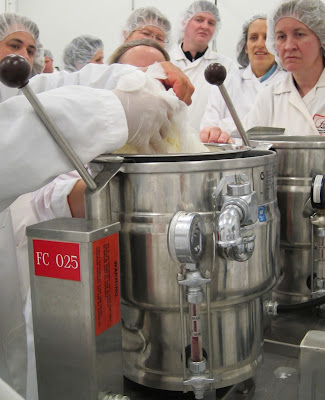The Interviewer: Echoing Stakeholders' Voices
I am in the process of carrying out 20 interviews about culture change in a municipal department. Once I’ve collected the information, I’ll prepare a report documenting the department’s achievements and providing a how-to guide for other departments. This is the second corporate oral history that I have undertaken, and I have a better understanding of the process now than I did six months ago.
Each interview lasts 30-75 minutes, so the sheer quantity of information is overwhelming at first. The research topic is very broad, encompassing objectives, outcomes, processes and people; and the interview questions are, of necessity, open ended.
In addition, I am coming in as a complete outsider and have limited knowledge of the subject matter, so the topic evolves as I carry out the interviews and learn more and more. I have to be flexible and open to new information that may alter my initial comprehension of the topic.
Of course, it’s also my greatest strength that I am an outsider because I can stand back and view the full scope of the project without my personal involvement slanting my perspective.
The people I am interviewing have been selected because of their lengthy and intense involvement with the topic. They are passionate about the subject and eager to share their knowledge and experience. As a result, they frequently entrust me with confidential or personal information. I have to handle the confidential information respectfully and use it appropriately.
I am learning that an interviewer is never an impartial observer. I recognize in myself a tendency to root for the underdog and to favour one position over another. Plus, I like some people more than others. And some people are more outgoing and better raconteurs so their opinions come across more strongly than other people’s.
Of necessity, I am collecting information from diverse perspectives (in this case, union, management, human resources). As a result, I become aware of conflicts or differences of opinion. I am very tempted to explore the differences and to examine the possible consequences of these fault lines. But that isn’t my job.
My job is to synthesize the information for a specific purpose. It doesn’t mean that I ignore the conflicts or differences of opinion, but it does mean that I package them differently. My objective isn’t to explore the origins or the possible outcomes of the conflict, but simply to acknowledge the part it played in the process.
Synthesizing and organizing the interview transcripts is a daunting task. I have to keep reminding myself that despite the intensity of the discussion, I, personally, am irrelevant. I am simply a channel or receptacle for the interviewees’ information. If I do a good job, the final report will echo the stakeholders’ voices, and I will be invisible.
See also: Corporate Storytelling
Each interview lasts 30-75 minutes, so the sheer quantity of information is overwhelming at first. The research topic is very broad, encompassing objectives, outcomes, processes and people; and the interview questions are, of necessity, open ended.
In addition, I am coming in as a complete outsider and have limited knowledge of the subject matter, so the topic evolves as I carry out the interviews and learn more and more. I have to be flexible and open to new information that may alter my initial comprehension of the topic.
Of course, it’s also my greatest strength that I am an outsider because I can stand back and view the full scope of the project without my personal involvement slanting my perspective.
The people I am interviewing have been selected because of their lengthy and intense involvement with the topic. They are passionate about the subject and eager to share their knowledge and experience. As a result, they frequently entrust me with confidential or personal information. I have to handle the confidential information respectfully and use it appropriately.
I am learning that an interviewer is never an impartial observer. I recognize in myself a tendency to root for the underdog and to favour one position over another. Plus, I like some people more than others. And some people are more outgoing and better raconteurs so their opinions come across more strongly than other people’s.
Of necessity, I am collecting information from diverse perspectives (in this case, union, management, human resources). As a result, I become aware of conflicts or differences of opinion. I am very tempted to explore the differences and to examine the possible consequences of these fault lines. But that isn’t my job.
My job is to synthesize the information for a specific purpose. It doesn’t mean that I ignore the conflicts or differences of opinion, but it does mean that I package them differently. My objective isn’t to explore the origins or the possible outcomes of the conflict, but simply to acknowledge the part it played in the process.
Synthesizing and organizing the interview transcripts is a daunting task. I have to keep reminding myself that despite the intensity of the discussion, I, personally, am irrelevant. I am simply a channel or receptacle for the interviewees’ information. If I do a good job, the final report will echo the stakeholders’ voices, and I will be invisible.
See also: Corporate Storytelling




Comments